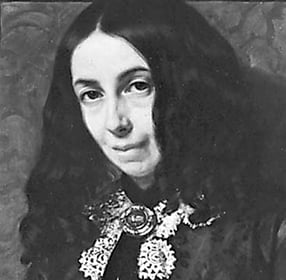The Seraph and Poet
The seraph sings before the manifest
God-one, and in the burning of the Seven,
And with the full life of consummate Heaven
Heaving beneath him like a mother’s breast
Warm with her first-born’s slumber in that nest!
The poet sings upon the earth grave-riven:
Before the naughty world soon self-forgiven
For wronging him; and in the darkness prest
From his own soul by worldly weights. Even so,
Sing, seraph with the glory! Heaven is high—
Sing, poet with the sorrow! Earth is low.
The universe’s inward voices cry
‘Amen’ to either song of joy and wo—
Sing seraph, —poet, —sing on equally
This poem is in the public domain. Published in Poem-a-Day on July 7, 2024, by the Academy of American Poets.
“The Seraph and Poet” is found in The Poems of Elizabeth Barrett Browning, Volume 1 (James Miller, 1869). In his essay, “Elizabeth Barrett: The Poet as Angel,” literary critic David G. Riede reflects on Barrett Browning’s work, saying, “For her, angels were entirely real, and both her enthusiastic romanticism and her fervent Christianity led her to posit the angel as a type of the poetic character. […] Far from being ‘picturesque nonsense,’ as [poet] Angela Leighton has recently said, the ‘angel imagery’ in Barrett’s work––at least in her very early work––is crucial to her construction of a poetic character at the nexus of female and male traditions, and (not quite the same pairing) of romantic and Christian traditions. […] From a very early age [Barrett Browning] was intent on rivaling the greatest poets of the ages, and though she learned to moderate her aspirations as she matured, she always aspired to a lofty ideal of the poet as a chosen spirit, a visionary in touch with transcendent truth and able to transmit that truth to the larger public.”

